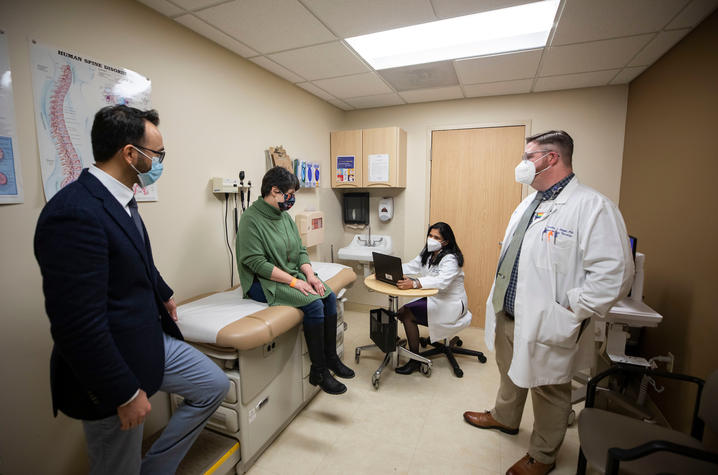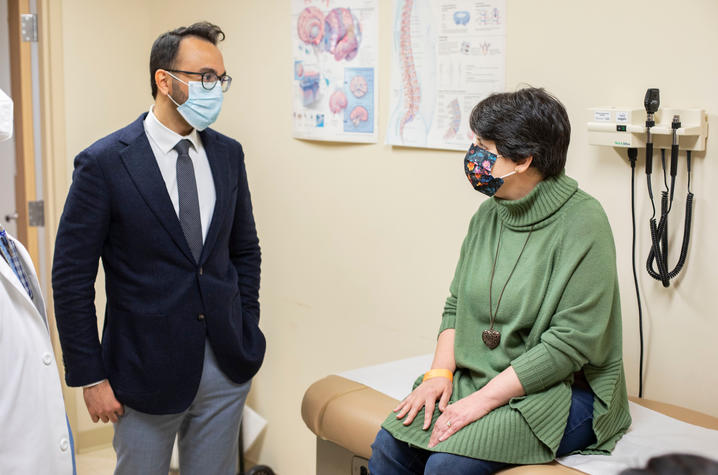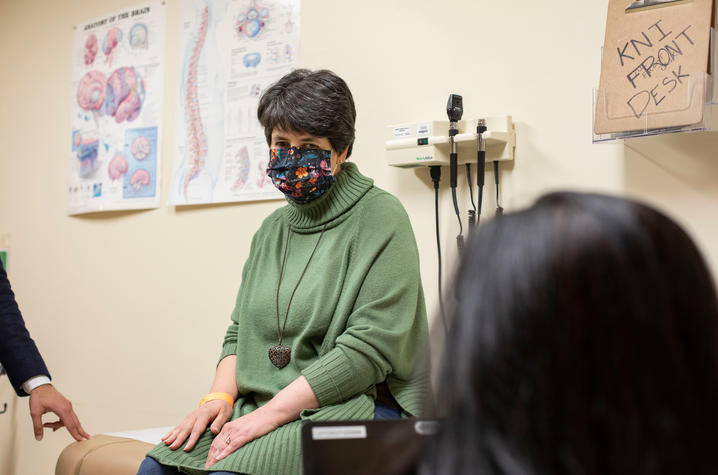‘She Was No Longer My Sister’ – UK Neurologists Help Patient Suffering from COVID-Induced Psychosis
LEXINGTON, Ky. (Jan. 27, 2022) — Aleina and Kelly Milligan are more than sisters - they are truly best friends. For Kelly, her older sister has been a lifeline during the past two years.
“I was so excited when she decided she wanted to move down here because I thought, ‘This is awesome! I’m going to get to have my sister,’” Aleina said. “And then she got so sick.”
Kelly has dealt with seizures her entire life. She lived and worked in a sheltered employment program in Michigan and had worked as a custodian for 29 years. After experiencing some health issues while at work and after their mother passed away, Kelly decided to move to Kentucky.
“She had no support system in Michigan, and it was just too much,” said Aleina.
As she settled in with her sister in Columbia, Kentucky, Aleina became concerned when she noticed a change in Kelly’s seizure patterns. The sisters then made the trip to Lexington for an appointment with UK HealthCare’s Sally Mathias, M.D., assistant professor of Neurology, who specializes in epilepsy.
“When I first saw her, I knew we needed to know more,” Mathias said. “She had never had some of the basic testing that is required for epilepsy, so we started off with that.”
The fact that Kelly’s seizure patterns had changed stood out to the epilepsy specialist, but that wasn’t all.
“What is very rare is that her heart was actually stopping with every seizure — it is called ‘ictal bradycardia,’” said Mathias. “We noticed that on the Epilepsy Monitoring Unit. The longest her heart stopped while she was in our hospital was 20 seconds.”
To explore this further, they sent her home with a heart monitor for a few weeks. While at home, the heart monitor detected 30 seconds in which Kelly’s heart had stopped.
“This was very serious and needed immediate attention,” said Mathias. “We directly admitted her to cardiology, and she got a pacemaker.”
Kelly was shocked to learn about what was happening with her body. This was all new for Aleina, but as they learned, she more says it did start to make sense.
“I was with her several times and experienced when she would just drop,” Aleina said. “There was one time I kept looking at her and thought ‘She is not breathing … surely not though, she must be breathing.’ After we found this out, I’m like, ‘Okay she wasn’t breathing.’ We are very fortunate that nothing has happened, and her heart continued to restart.”
After receiving her pacemaker, the next step for Kelly was epilepsy surgery, something she had never considered before meeting the doctors at UK HealthCare.
“It still baffles me that no one ever did basic testing for epilepsy on her, and that when I discussed epilepsy surgery with them, it was the first time they had heard of it,” said Mathias.
In August of 2020, Farhan Mirza, M.D., assistant professor in the Department of Neurosurgery and director of Epilepsy Surgery, successfully conducted surgery on Kelly’s brain. For the first time, she or her sister can remember, Kelly was seizure-free.
“We could go places and not have to go through the thought process of ‘what if?’” said Aleina. “For example, I had been thinking it would be wonderful to visit the beach and go swimming, but I was always afraid to get her in the water because what if she dropped?”
“Kelly's journey, like so many of our patients with refractory epilepsy, highlights two important things: No one should have to suffer from uncontrolled epilepsy for decades, and all patients who are resistant to anti-epileptic medications deserve to be evaluated for possible surgical options in a timely fashion,” said Mirza. “This can be done effectively only at highly specialized centers like UK where we offer advanced multi-disciplinary care for refractory epilepsy.”
The sisters were thrilled to have a greatly improved quality of life as Kelly celebrated her 50th birthday complete with a crown and a sash, less than two months after her epilepsy surgery.
“She was not limited anymore, and that is fantastic,” said Aleina.
*****
Just weeks after celebrating her 50th birthday, two-and-a-half months out from her brain surgery, Kelly contracted COVID-19. She started showing symptoms about a week after Aleina came down with the virus. As Aleina recovered, Kelly’s symptoms worsened.
“She started telling me that she was having these strange neurological symptoms – tingling, burning, rushing feelings in her hands and feet, and continuous thoughts that she could not control,” said Aleina. “Kelly had never had any mental problems other than minor anxiety.”
After a few months of feeling like they could finally enjoy life together, Aleina was again reaching out to doctors with great concern for her sister.
“I read some articles about studies looking at the possibility that COVID can attack the weakest part of a person,” said Aleina. “I just assumed that would be her brain because she just had this major surgery.”
At that point, COVID-19 was still relatively new. Aleina says the doctors she spoke with did not know much about the virus other than to tell her that if Kelly’s breathing was okay, then she was okay.
“She continued to get worse … her brain, the tingling,” said Aleina. “It never presented in her lungs, but she just kept acting more strangely. She would say she was on fire and that she felt there was something evil after her.”
Kelly does not remember much of this time, and Aleina says that is a good thing. After about 10 days, Aleina took her to their local emergency department because she was afraid her sister was having another seizure. She wasn’t. She did have a fever and low sodium, but nothing obscure was detected.
The sisters continued to live like this for several more days and found themselves in the midst of the holiday season. Kelly continued to have a growing feeling that something was invading her body and mind. She then ended up back in the hospital with pancreatitis, which doctors attributed to her prior COVID-19 infection. Then just a few days after Christmas, Kelly tried to harm herself, and she was admitted to Eastern State Hospital.
“She was in full-blown psychosis,” said Aleina. “She was hallucinating and thought she was being told to harm herself or us.”
Her neurology doctors at UK HealthCare were contacted and had her come in for a visit.
“They were very concerned for her, but at that time there really were not any reports of COVID harming anybody mentally,” said Aleina. “They just didn’t know if it could be related.”
After three weeks at Eastern State Hospital, Kelly returned home on some medication that helped for a little while, but then she quickly took a turn for the worse.
“She had gotten so bad … she was no longer my sister,” Aleina said. “It was horrible.”
Kelly was not eating. She would not communicate. Then, she began abusing her medications.
“I got ahold of Dr. Mirza and Dr. Mathias, and I was very honest with them and begged them to get her in for an appointment,” said Aleina. “I said, ‘I don’t know what is going on, but something is wrong, and she is going to die if we do not figure this out.’”
Aleina was able to get Kelly back to Lexington, where Drs. Mirza and Mathias along with neuropsychologist Timothy Ainger, Ph.D., talked with her. The team universally decided that Kelly couldn’t be sent back home. As part of her pre-surgical epilepsy workup, Kelly had undergone a neurocognitive evaluation. By looking back at her baseline, they knew right away something was not right.
“So, we looked at all of her thinking skills, her memory, her attention and concentration. It is a very comprehensive evaluation of your cognitive abilities and how well your mind is functioning,” said Ainger. “She had gone from being talkative, engaged, and polite to being terrified, psychotic, and reserved.”
Her epilepsy doctors, Mirza and Mathias, had seen this surgery done successfully on so many patients and knew that this reaction was not typical.
“We were naturally thinking, ‘Okay, what else is going on?’” said Mathias.
They felt good about Kelly’s procedure, but also knew that these issues occurred not long after she had undergone a major brain surgery.
“She was doing great from a procedure perspective and didn’t have any issues,” said Mathias. “After surgery, some issues can develop. So that is what we were thinking … maybe it wasn’t entirely because of the surgery … but I did have that in the back of my mind because I can’t exclude that.”
Additionally, the doctors say that operating on that specific area of Kelly’s brain wasn’t a likely cause for the type of psychiatric symptoms she was having. When Ainger looked through Kelly’s medical notes and history, he realized what the culprit was.
"It then became very obvious: right after she had just come out of the acute COVID illness, she had this rapid and sudden onset of symptomology,” said Ainger. “It was very similar to what the literature has been suggesting in the few cases that existed and very similar in one or two other patients that we had treated.”
With all that considered, they moved forward in treating this as some form of COVID-induced encephalitis, which is swelling of the brain. The team began immunoglobulin therapy for Kelly and changed one of her seizure medications.
“Within one week, my sister was back,” said Aleina. “She was still medicated with the anti-psychotic medication, but she was Kelly again.”
Since then, Aleina says they have been able to back Kelly off from 20 milligrams of her antipsychotic medication to one milligram.
“We completely believe we are going to be able to have her off that completely very soon,” Aleina said. “She is doing great. It has been a real journey.”
*****
In the course of a year, Kelly has been on a roller coaster with her health: a dramatic brain surgery to rectify seizures, a bout of COVID-19, the development of psychosis, and then - thanks to intervention - back to normal and seizure-free. Through all those ups and downs, she and her sister are thankful for the team at UK.
“Because of the way this team works together, it was not six months, nine months, or even 12 months of working with other hospitals and dealing with referrals,” said Ainger.”We were able to just walk into each other’s offices, have meetings, and get this managed right away. That is not the kind of service people get from hospitals that don’t have multidisciplinary teams like this.”
In this case, the teamwork even went outside of the neurology department – it also included cardiology, considering Kelly’s prior heart issues and pacemaker.
“This one was different and a lot of cross-functional teamwork, but we do this for every patient,” said Mathias. “We come together to help our patients especially when they are going through such difficult times.”
Thanks to their teamwork and dedication, Kelly and Aleina are now finally getting to enjoy living in the same place.
“I’ve got her back and so now we can grow old together,” said Aleina. “I’m kind of already there, but we are so looking forward to it.”
“Kelly's story is truly one of years of anguish, a glimpse of seizure freedom, a calamitous decline, followed by a complete recovery,” said Mirza. “We are thrilled to see her faring so well and are honored to have been a part of Kelly and Aleina's inspirational journey.”
As the state’s flagship, land-grant institution, the University of Kentucky exists to advance the Commonwealth. We do that by preparing the next generation of leaders — placing students at the heart of everything we do — and transforming the lives of Kentuckians through education, research and creative work, service and health care. We pride ourselves on being a catalyst for breakthroughs and a force for healing, a place where ingenuity unfolds. It's all made possible by our people — visionaries, disruptors and pioneers — who make up 200 academic programs, a $476.5 million research and development enterprise and a world-class medical center, all on one campus.







